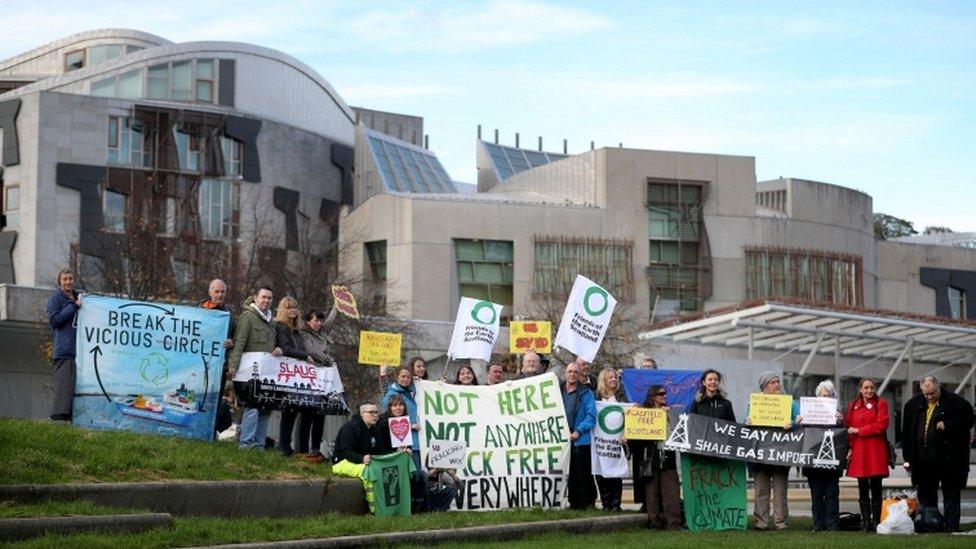The Scottish government's 'effective ban' on fracking
- Published

Protestors gathered outside Holyrood ahead of the debate
Of all the public functions undertaken by government, both central and local, planning is perhaps the most easily neglected. Except, that is, when it impinges directly upon an individual or a community.
Then the discourse can be frenzied as people feel that their territory, their rights or their livelihood may be affected.
For example, I have seldom seen more passion engendered in the public interest than over the topic of windfarms.
Rightly or wrongly - and I am certainly not here to judge - folk get mightily exercised over such proposed developments and are wont to express their views in forthright fashion.
Ditto fracking - or hydraulic fracturing, the process whereby oil and gas reserves are extracted from shale rock by deploying drilling and high-pressure water.
The debate over this topic in Scotland has been intense and protracted.
'Scenic route'
Indeed, as it reached its culmination at Holyrood today, Liam MacArthur of the Liberal Democrats gently - very gently - chided the Minister, Paul Wheelhouse, for taking the "scenic route" in arriving at his destination.
And that destination? An effective ban. As opposed to what, an ineffective ban? Certainly, the terminology provoked yet more debate. Why could there not be a law simply banning fracking outright?
Mr Wheelhouse explained that this would tie up scarce parliamentary time which might be required for such minor matters as Brexit.
Others in government have argued that a new law is unnecessary and ineffectual as it could be overturned by a future parliament in any case.
So what to do? The minister's approach is to transform an existing temporary moratorium into a lasting ban, deploying planning law. That will then be finalised following a further strategic environmental assessment. (Told you this was a protracted tale.)
Paul Wheelhouse does not believe legislation is needed to enforce a fracking ban
So were opponents of fracking in Holyrood furious? They were not. Perhaps all passion is spent: highly unlikely given the emotions generated.
It would appear, rather, that the lengthy period of consultation has produced something approaching a consensus - at least, among those who dislike hydraulic fracturing.
The signs were evident. For the Greens, Mark Ruskell delivered a powerful, thoughtful critique of fracking, condemning it as the "fag end" of the fossil fuel age.
But he also took pains to praise the Liberal Democrats and to laud Labour's Claudia Beamish who offered to withdraw her own member's Bill on the issue, provided the policy of a ban were inserted into the National Planning Framework and that this should be subject to parliamentary vote in the event of any proposed change.
Mr Ruskell also praised the minister for a readiness to listen. It would seem that Mr Wheelhouse's lengthy endeavours have not been in vain.
Moment of passion
His speech, mostly, dealt with detail, fittingly given the nature of the topic. However, there was one moment of passion which perhaps mirrored the controversy which the issue engenders around Scotland.
To listen to the advocates of fracking, he said, one would imagine that fracking would take place in Scotland well away from centres of population. That, he said, was definitively not the case.
And those advocates? Murdo Fraser was in eloquent form for the Conservatives. The policy of a ban was job-destroying madness, particularly when the Grangemouth petrochemical complex was already importing fracked gas from the US.
Mr Fraser said he could not make up his mind which was worse. The abandonment of evidence-based policy, the neglect of science or the "hypocrisy" of a government which fostered fossil fuels in other ways yet wanted to confine fracking to other countries.
He also accused the SNP of "dancing to the tune of the Green Party", perhaps with an eye to pending budget talks. To be fair, any Ministerial jig would also be accompanied by a few bars of Nationalist activism. And, to be fair further, Mr Wheelhouse is adamant that his decision reflects a balanced calculation of benefits and costs.